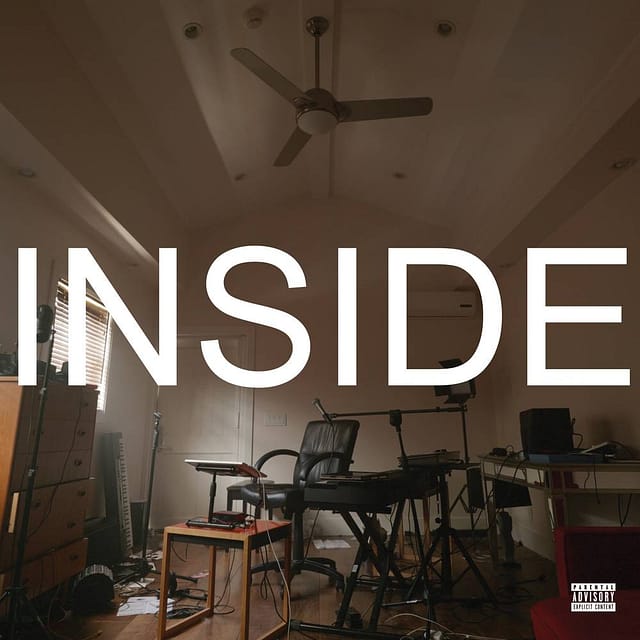
Bo Burnham’s Inside: a Metamodern Masterpiece Co-opted by Algorithmic Cynicism
Bo Burnham employs raw emotional intensity and cheeky irony in an attempt to “heal the world with comedy” in his Netflix special, Inside. For some on TikTok, it might have worked too well, but maybe that was inevitable.
We did need healing, though—the last year-and-a-half has been traumatic. The alchemical tincture of pandemic, murder, unrest, and—very nearly—civil war, incorporated with a base of ever-present climate despair, intoxicated most of us with a profound sense of derealization and a general dysphoria.
You don’t need reminding, I know, but to see the headlines laid out in a single sentence—or a single comedy special—helps justify the PTSD we are all experiencing. Inside functions much like the exposure therapy sometimes prescribed by clinical psychologists who treat that disorder.
The special, which was written, directed, performed, and edited by Burnham himself, masterfully weaves a viscerally troubling (mostly fictional) narrative of a sensitive thirty-year-old who spends 2020 locked in a studio apartment, gradually losing his sanity. When I finished it, I immediately pulled out my phone and, when I typed, “Is B,” I was unsurprised to find “Is Bo Burnham OK?” suggested by autofill.
Blending simultaneous sincerity and sarcasm in harmony with the philosophical school of Metamodernism’s take on media, he couches mental-health-devastating global problems in catchy, upbeat techno and sometimes-cheesy jokes.
However, an element of the piece—authentic, if exaggerated, despair—has been co-opted and watered down by a TikTok trend that the company’s algorithm refuses to let me escape. The memes declawing Burnham’s most emotional song, All Eyes on Me, dangerously misrepresent his apparent impetus for performing. They promote a permissive atmosphere toward inaction in the face of the myriad societal problems Burnham sings about.
On the other hand, they also demonstrate that his attempt at exposure therapy worked.
“Dontcha know the world is built with blood! And genocide! And exploitation!” — “Sock-o”, How the World Works
In a subtle nod to a comedic hero of Burnham’s, the absurdist Hans Teeuwen who often used a similar shtick, Burnham duets How the World Works with a woke gym sock. Satirizing childrens’ shows, the puppet belts a sing-songy tirade against “the global network of capital,” “neo-liberal fascists,” “the pedophilic corporate elite,” and other alleged oppressors.
Listening to Sock-o’s grievances—which hit the bullseye for many denizens of the internet filter-bubble to which I belong—you get a good sense for what Metamodern philosopher Seth Abrams means by “simultaneous sincerity and sarcasm.” The kid’s show medium and the sprinkling of absurd claims lifts up the heavy, depressing message delivered by Sock-o’s legitimate call-outs.
And if that isn’t enough sugar to help the medicine go down, the song itself is bookended by FaceTime with my Mom (Tonight) and White Woman’s Instagram. Both exude little else besides light-hearted silliness; the former captures the experience of video-calling family during lockdown and the latter takes a somewhat cheap potshot at Influencers’ saccharine cutesiness.
By repeatedly dunking us into uncomfortable truth and then pulling us up for air with relatable or recognizable tropes, Burnham assuages the viewers’ unease. Every interruption to the gasping panic about suffocating under society’s ills pushes the viewer closer to being conditioned out of the reflex.
The whole special ping pongs between provoking anxiety and soothing with humor—sometimes within a single song, other times via juxtaposition in the composition of its setlist. The most poignant example of a message-interrupting wink comes in the show’s final act, though.
“My current mental health is rapidly approaching an ATL… that’s an All Time Low, not ‘Atlanta’” — All Time Low
All Eyes on Me hit me hard.
In a voice-changed monologue that makes him sound unsettlingly like Deepthroat, Burnham describes his plan to return to performing after five years of improving his mental health in response to having panic attacks onstage. A plan destroyed by COVID.
The song crescendoes with repeated commands that would work just as well for a bankrobber as a performer, “Get your fuckin’ hands up. Get on out of your seats. All eyes on me.” Burnham finally violently kicks back his piano bench, grabs the camera and swings it around in front of his face, repeating the refrain—which, no joke, had me questioning whether I should get off the couch—until he seems to completely lose it and thrashes his lighting and recording equipment. The song abruptly ends.
You get the sense that his mental health has been derailed by the project. If it was on LiveLeak instead of Netflix, there were several points during the special I would have been earnestly worried it was a snuff film. But after a smash-cut to black, Burnham pulls us up for air again showing himself brushing his teeth, then eating a bowl of cereal while playing the song’s recording back on his laptop, his legs crossed comfortably.
The special is full of moments like this. After saying the whole special will be shot in the studio’s living area, the very next shot is in the kitchen, establishing that he’s lying very early on. Burnham shows us a sound test that he prefaces with “idea for final song,” before transitioning into the last piece, demonstrating that despite time passing—concretely evidenced by his hair growth—he knew the arc the story would take before he even began.
The message is that he is taking care of himself. The narrative is planned. It’s only performance art. That spliced-in toothbrushing self-care routine breaks the fourth wall to let us know that he—that all of us—can fully embody despair one moment, then let it pass and carry on with life.
“Don’t overthink this. Look in my eye. Don’t be scared. Don’t be shy. Come on in, the water’s fine… You say the ocean’s rising like I give a shit.” — All Eyes on Me
Nearly every lyric has layers of meaning in Inside, but All Eyes on Me is particularly multivalenced. When Burnham tells us not to “overthink this,” he is simultaneously referring to the special itself, his apparent emotional breakdown, and the trauma we’ve all been through in the last 18 months.
To the exact degree that I have clearly failed to not “overthink this” special, TikTok took the invitation and ran with it.
The format of the meme is straightforward, but here’s an example. If you can’t watch a video right now, I’ll break it down: the TikTok user lip syncs, “Don’t be scared. Don’t be shy. Come on in, the water’s fine,” while the caption reads, “Nothing in the Employee Handbook says no Heely Crocs;” then, dressed professionally, he continues to lip sync, “You say the ocean’s rising,” and the caption now says, “HR: It’s unprofessional;” and finally, gliding into the room on his Heelys, he lip syncs “Like I give a shit.”
While some videos retain the song’s pathos, many exhibit a similar level of flippancy.
They all follow the same pattern: the TikTok user pitches some idea; the same user, from a different camera angle, plays the person being pitched to; we return to the original shot for “like I give a shit.” I’ve seen iterations with everything from hating hiking, to recruiting day-drinking companions, to trying pegging.
The next couple lines in the full recording demonstrate how this glibness subverts the song’s mood: “You say the whole world’s ending? Honey it already did. You’re not gonna slow it—heaven knows you tried.”
By naming our despair, Burnham has given us permission to heal from our trauma. His sarcasm and absurdity soften the exposure therapy, but the sincere parts of the special ask us to wake up to the world’s injustice, to cynical corporate gesturism, and to imminent global collapse. It’s not enough to acknowledge the pain caused by the feeling of powerlessness and move on or go back to normal.
Once you’ve healed from trauma, the next step is to integrate the lessons accompanying the heartbreak and rebuild yourself better.
Inside is good for the first part of that equation, but, distilled for virality, it may not be right for the second part.
“Latte foam art, tiny pumpkins, fuzzy, comfy socks… is this heaven? Or am I looking at a white woman’s instagram?” — White Woman’s Instagram
Burnham damages his own efficacy as a healer by creating something that can be appreciated on the same level as latte foam art: superficial aesthetics. He wrote some real earworms and zingers. The production is varied and stylish to the point of being surprisingly spectacular for a 90 minute piece shot in his tiny guest house.
Inside manages to visit both poles of potential success: it’s commercial and art at the same time. This metamodern resistance to consistently embodying one side of a binary is necessary to comprehend the work’s implicit call to action.
If the viewer absorbs only the authentic despair, they will leave depressed. If they focus, instead, on the ironic jokes that’s even worse. Comedy is only tragedy plus time to those whose lives aren’t destroyed; to them, it will just feel like hall pass for strangers who want to be callous. Only by appreciating both the sincerity and the sarcasm can a viewer feel their burden lift just enough to get to work. Unfortunately, the media virus based popular culture does what it does best—ignore nuance—and Inside’s way of passing out permission slips for dickishness may be doing more harm than good.
Burnham shouldn’t be blamed, though; it might be impossible to create something that will be exposed to the attention economy without the algorithms surfacing and popularizing a narrative that is deleterious to the human experience.
It was algorithms on Reddit that helped propagate the toxic masculinity inspired in part by a similarly-surface-level appreciation of Fight Club.
Identity Politics aims to protect and empower the culturally vulnerable, but algorithms package and sell it as a kind of recursive outrage that Burnham hints at lyrically with “the backlash to the backlash to the thing that’s just begun.”
Tactics that successfully advertise well-intentioned apps like Headspace promote the degradation of meditating in search of enlightenment to practicing mindfulness so you can be a more productive cog in the machine destroying our planet.
Neither art nor social movements nor technology is safe from exposure to our profoundly sick society.
Let’s get outside and fix it.

Geoff Gallinger writes poems, essays and fiction and has said a time or two that a Bachelor’s in Creative Writing from SF State qualifies them perfectly for being a pizza driver. That sounds like self-deprecation, but hours a day completely alone in a beater car with an audiobook and a notepad for company are actually a good approximation of a “room of one’s own.”
Being home isn’t too bad either; their daughter and wife will always be their primary audience.
[…] Is your body ready for the poetry version of Bo Burnham’s Inside? […]
[…] sensemaking milleiu, and can compete for—or at least make a good case to share—the moniker of metamodernism. As such, many LTMs are interested in awakening from the Meaning Crisis that we find ourselves in as […]
[…] Metamodernism suggests the defining metaphors of our time are the network, the spectrum and addiction. If nothing else, technology is society’s all-consuming addiction. […]
[…] Is your body ready for the poetry version of Bo Burnham’s Inside? […]